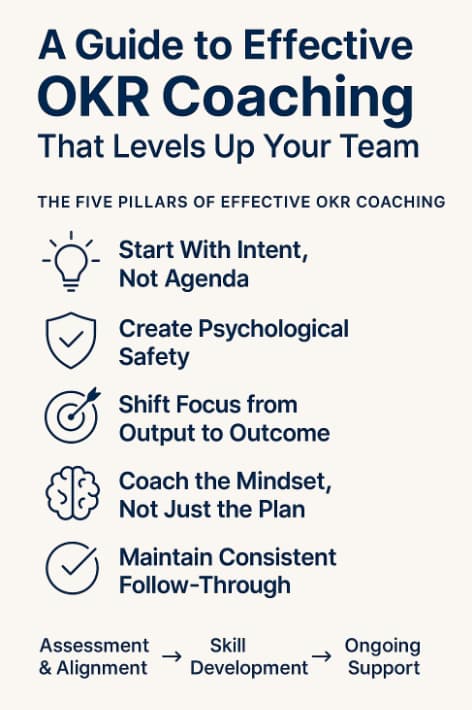A Guide to Effective OKR Coaching That Levels Up Your Team
It’s no secret that implementing OKRs (Objectives and Key Results) in your organization is just the beginning. The real magic happens when you have effective coaching to support your teams throughout their OKR journey. Without proper OKR coaching, even the most well-crafted goals and strategies can become nothing more than checkboxes on a to-do list.
This comprehensive guide will explore the important role of OKR coaching, the key principles that make it effective, and practical strategies to help you level up your team’s performance through OKR coaching.
What is OKR Coaching and Why Does it Matter for Businesses?
OKR coaching is fundamentally different from traditional management or mentoring. While mentoring involves sharing experience and giving advice, coaching focuses on asking the right questions, challenging assumptions, and helping people discover their own solutions. The role of an OKR coach is to guide individuals and teams toward insights that connect their goals to meaningful, measurable outcomes.
Effective OKR coaching creates a supportive environment where teams can reflect on their progress, identify obstacles, and develop strategies to overcome challenges. It transforms the OKR process from a mechanical exercise into a dynamic system of growth, alignment, and continuous improvement.
The Five Pillars of Effective OKR Coaching
Now, let’s talk about the core pillars of OKR coaching and how they can help business leaders tear down siloes across their teams and drive unprecedented growth.

1. Start With Intent, Not Agenda
Many coaching sessions begin with a status update approach: “How are your OKRs progressing?” This immediately sets the wrong tone. Effective OKR coaching starts by connecting the work to its deeper purpose and understanding the underlying challenges.
Before diving into metrics and progress reports, successful coaches ask fundamental questions that help teams reconnect with their “why.” They explore what obstacles are preventing progress, where friction exists between goals and execution, and what blind spots might be hindering success. This approach helps teams see beyond the immediate tasks and understand how achieving their OKRs contributes to their personal growth and the organization’s mission.
The most effective coaching sessions begin by anchoring the conversation with a purpose. When teams understand why their work matters, they naturally become more motivated and engaged. This connection between individual effort and organizational impact is what transforms routine goal-setting into meaningful achievement.
2. Create Psychological Safety
Psychological safety is the foundation of effective coaching. Teams need to feel safe enough to share honest feedback, admit when they are struggling, and discuss failures without fear of blame or punishment.
This environment of trust is essential for the kind of open dialogue that leads to breakthrough insights. Creating psychological safety requires coaches to ask genuine questions rather than leading ones, listen without interrupting or judging, and allow silence to create space for reflection. When team members feel heard and understood, they become more willing to examine their own performance honestly and take ownership of their results.
The coaching relationship should feel like a partnership rather than an evaluation. This collaborative approach encourages teams to view challenges as opportunities for growth rather than threats to their performance ratings.
3. Shift Focus from Output to Outcome
One of the most common pitfalls in goal-setting is confusing activity with progress. Teams often celebrate completing tasks without considering whether those tasks actually moved them closer to their objectives. Effective OKR coaching helps teams maintain focus on outcomes rather than outputs. This can be done through successful ORK goal setting and tracking.
For example, “We launched a new feature” is an output, while “We increased user engagement by 25%” is an outcome. Coaches must consistently redirect conversations toward impact and results. They ask probing questions about whether the current approach is generating the desired outcomes and whether the team is measuring what truly matters.
This shift in focus requires coaches to challenge teams when they present activity-based updates. Instead of accepting “We completed all our planned tasks,” effective coaches ask, “What impact did those tasks have on your Key Results?” This persistent focus on outcomes helps teams develop a results-oriented mindset.
4. Coach the Mindset, Not Just the Plan
Powerful OKR coaching goes beyond tactical advice to address the underlying mindset and behaviors that drive success. Coaches help teams develop the mental frameworks necessary to set ambitious goals, maintain accountability, and persist through challenges.

This involves calling out limiting behaviors such as setting safe goals to avoid failure, using vague metrics to avoid accountability, or confusing effort with value creation. Coaches challenge teams to think bigger and ask not just “What will you do?” but “What kind of leader do you want to become through this process?” Mindset coaching also involves helping teams develop resilience and adaptability.
When OKRs are not progressing as expected, coaches help teams reframe setbacks as learning opportunities and adjust their approach rather than abandoning their goals.
5. Maintain Consistent Follow-Through
Coaching is not a one-time intervention but an ongoing relationship that requires consistent follow-through. The most effective coaches establish regular check-ins and maintain accountability between formal coaching sessions.
This consistency builds trust and ensures that insights from coaching sessions are actually implemented. Coaches follow up with questions about how teams are applying what they learned, what progress has been made since the last session, and what specific actions they can take immediately to advance their OKRs.
Regular follow-through also allows coaches to track patterns over time and provide more targeted support. They can identify recurring challenges and help teams develop systematic approaches to overcome them.
The Coaching Process: A Step-by-Step Framework
Now, let’s step into an easy-to-follow OKR coaching framework that business leaders can implement in their organization.
Phase 1: Assessment and Alignment
The coaching process begins with a thorough assessment of the team’s current state. This includes reviewing existing OKRs, understanding the team’s challenges, and identifying areas where coaching can have the greatest impact.
During this phase, coaches work with teams to ensure their OKRs are properly aligned with organizational objectives and that the Key Results are truly measurable and meaningful. This foundational work is critical because coaching cannot fix fundamentally flawed OKRs.
Phase 2: Skill Development
Once the foundation is solid, coaches focus on developing the skills teams need to succeed with their OKRs. This includes training on how to track progress effectively, how to identify and remove obstacles, and how to adapt their approach when circumstances change. One big step to fulfill this goal is to engage in valuable OKR certification courses to develop these important skills.
Skill development also involves helping teams improve their communication and collaboration around OKRs. This includes learning how to have productive conversations about progress, how to ask for help when needed, and how to celebrate successes appropriately.
Phase 3: Ongoing Support and Refinement
The final phase involves providing ongoing support as teams work toward their objectives. Coaches help teams navigate challenges, maintain motivation, and continuously refine their approach based on what they learn.
This phase is where the real value of coaching becomes apparent. Teams that receive consistent support are more likely to achieve their OKRs and develop the capabilities needed for long-term success.
Common OKR Coaching Challenges and Solutions
Before diving head-first into OKR coaching, it’s important to review these common challenges and how to overcome them with ease.
Challenge 1: Teams Resist Ambitious Goal-Setting
Many teams are naturally inclined to set safe, achievable goals to avoid the risk of failure. Coaches can address this by helping teams understand the value of stretch goals and creating a culture where partial achievement of ambitious goals is celebrated.
Solution: Frame aspirational OKRs as learning opportunities rather than pass/fail tests. Help teams understand that achieving 70% of an ambitious goal often represents more progress than achieving 100% of a conservative goal.
Challenge 2: Lack of Engagement from Leadership
OKR coaching is most effective when it has strong support from organizational leadership. Without this support, coaches may struggle to create the cultural changes necessary for OKR success.
Solution: Work with leadership to demonstrate the value of coaching through pilot programs and success stories. Show how coaching contributes to better business outcomes and employee engagement.

Challenge 3: Inconsistent Implementation Across Teams
Different teams may adopt OKRs and coaching at different rates, creating inconsistency in the organization’s approach to goal-setting.
Solution: Develop standardized coaching processes and training materials while allowing for customization based on team-specific needs. Create communities of practice where successful teams can share their experiences with others.
How to Measure OKR Coaching Success
To ensure that OKR coaching is delivering value, organizations need to establish metrics for measuring its effectiveness. These might include:
Quantitative Measures:
- OKR achievement rates before and after coaching implementation
- Employee engagement scores related to goal-setting and performance
- Time to goal completion and quality of goal achievement
- Qualitative Measures:
- Feedback from coaching participants about the value and impact of coaching
- Observations of improved goal-setting behaviors and mindsets
- Stories of breakthrough achievements that can be attributed to coaching support
Build Your OKR Coaching Culture with Hyperdrive Agile
Effective OKR coaching is the bridge between setting ambitious goals and actually achieving them. It transforms the OKR framework from a static planning tool into a dynamic system for driving organizational performance and individual growth.
Here’s the key to success: OKR coaching lies in understanding that it is fundamentally about human development. While the framework provides structure, it is the coaching relationship that brings OKRs to life and helps teams unlock their full potential.
Organizations that invest in developing strong OKR coaching capabilities through advanced OKR certification courses, like those found at Hyperdrive Agile, will find that their teams not only achieve better results but also develop the skills and mindsets necessary for sustained success in an increasingly complex business environment.
Ready to get started? Check out our FREE introduction to scaled OKRs course and starter kit or get in touch with our expert team to see how we can help you achieve successful OKR coaching in your workplace.
Questions? We Can Help.
When you’re ready to move beyond piecemeal resources and take your Agile skills or transformation efforts to the next level, get personalized support from the world’s leaders in agility.